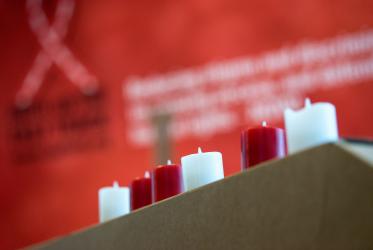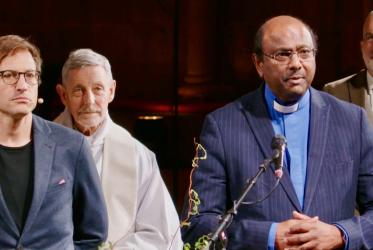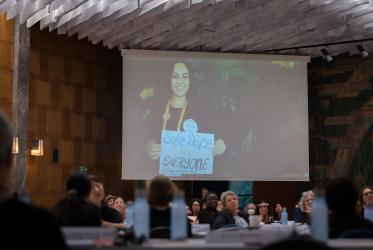"Over a number of years, the World Council of Churches Ecumenical Advocacy Alliance (WCC-EAA) has advocated for governments, intergovernmental organizations, religious leaders, faith organizations and individuals to fulfil their commitments to contribute to the vision of ‘getting to zero’ – zero new HIV infections, zero discrimination, and zero AIDS-related deaths,” explains Francesca Merico, HIV campaign coordinator of the WCC-EAA.
Gathered in Geneva, Switzerland on 26-28 September, the WCC-EAA HIV Strategy Group has now explored new strategies for advancing work towards overcoming HIV as a global health threat.
Among key issues on the table were looking at the second phase of the PEPFAR-UNAIDS Faith Initiative, exploring strategic steps towards faith communities’ presence at the 2018 International AIDS Conference in Amsterdam, and most essentially, strategic moves to step up the pace in ending AIDS as a public health threat. To do this, the WCC-EAA’s Live the Promise campaign is being re-conceptualized as Faith on the Fast Track, shaped around the UNAIDS Strategy to Ending AIDS by 2030.
"Through the Live the Promise campaign, the WCC-EAA accompanied faith communities around the world in taking considerable steps promoting HIV testing and access to treatment to all, mobilizing faith communities against stigma and discrimination and in promoting a human rights response to HIV,” Merico says.
"Yet the latest UNAIDS report shows that we are likely to fail in reaching the most urgent global targets in our response to HIV, particularly for children, adolescents, young women and girls and marginalized groups. More than ever, the world needs to involve all sectors of society to transform the response to HIV and AIDS."
Time to shift gears
“As people of faith we have a compelling vision of a world without injustice. We simply have no choice but to address the social drivers. With the Faith on the Fast Track HIV Campaign, we want to reenergize ourselves, the faith and the international community to maintain HIV as a global focus; to promote universal access to prevention, testing, treatment, care and support; to contribute to the elimination of stigma and discrimination; and the promotion of human rights,” says Lyn Van Rooyen, executive director of the Christian AIDS Bureau in Southern Africa.
“It is important to keep up the pace now, as we know the next few years are pivotal in responding to the HIV epidemic,” says Karen Sichinga, executive director of the Churches Health Association of Zambia. “We are convinced that the WCC-EAA can continue to play a key role on this journey.”
“This week we have been looking forward to renew our efforts, to think strategically about the role of the WCC-EAA in the global HIV response. At a time when funding is increasingly a challenge, what gives us hope as people of faith, is to keep building momentum among faith communities to remind everyone that HIV is not over yet,” adds Jean Claude Mwayabo Kazadi, senior technical adviser for HIV Care and Treatment at Catholic Relief Services.
“Through renewed efforts, as we continue to advocate for broader partnerships and stronger engagement of faith communities in responding to HIV, we hope to continue the momentum that has been achieved so far, and ensure that HIV and AIDS does not drop off the agenda, so that no one is left behind,” concludes Karen Plater from the Presbyterian Church in Canada, chair of the WCC-EAA HIV Strategy Group.
Faith on the fast-track - for children living with HIV (WCC press release of 13 September 2017)
“It will take faith to get down to business, to overcome HIV and AIDS” (WCC press release of 13 September 2017)
Treatment target for children living with HIV may not be reached by 2018 (WCC press release of 20 July 2017)
“It’s time to take action” – “Let’s make this virus powerless” (WCC press release of 19 June 2017)






